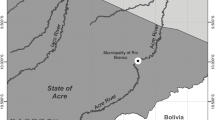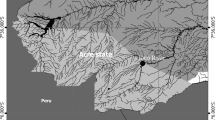Abstract
This study investigated the influence of temporal and seasonal (i.e., rainy and dry seasons) in communities and infracommunities of metazoan parasites in Pimelodus ornatus, a Siluriformes from the Amazon River in the state of Amapá, in northern Brazil. A total of 144 fish were collected during 2020 and 2021. In 2020, five species of parasites were found (1 Monogenea, 3 Nematoda, and 1 Cestoda), and in 2021, seven species of parasites were found (1 Monogenea, 3 Nematoda, 1 Cestoda, 1 Digenea, and 1 Crustacea). In 2020, Spirocamallanus inopinatus was dominant, while in 2021, Contracaecum sp. was dominant. Brillouin diversity, species richness, and evenness were higher in 2021. There were differences for some parasite infracommunities between years and between seasonal periods. Brillouin diversity and species richness were higher in the rainy season, but there were no differences in evenness and Berger-Parker dominance between the seasonal periods. Temporal and seasonal variations were mainly influenced by rainfall levels, oxygen levels, and environmental temperature and, later, by the availability of infective stages of parasites in the environment and the size of the hosts. Lastly, the influence of the temporal and seasonal variations on the structure of communities and infracommunities of parasites was weaker than expected due to the low infection rates of the majority of parasites found.







Similar content being viewed by others
Data availability
Not applicable for that section.
Code availability
Not applicable for that section.
References
Abreu CHM, de Barros LCM, Brito DC et al (2020) Hydrodynamic modeling and simulation of water residence time in the estuary of the Lower Amazon River. Water 12:660. https://doi.org/10.3390/w12030660
Arantes CC, Winemiller KO, Petrere M, Freitas CE (2019) Spatial variation in aquatic food webs in the Amazon River floodplain. Freshw Sci 38:213–228. https://doi.org/10.1086/701841
Baia RRJ, Florentino AC, Silva LMA, Tavares-Dias M (2018) Patterns of the parasite communities in a fish assemblage of a river in the Brazilian Amazon region. Acta Parasitol 63:304–316. https://doi.org/10.1515/ap-2018-0035
Blasco-Costa I, Rouco C, Poulin R (2015) Biogeography of parasitism in freshwater fish: spatial patterns in hot spots of infection. Ecography 38:301–310. https://doi.org/10.1111/ecog.01020
Bush AO, Lafferty KD, Lotz JM, Shostak AW (1997) Parasitology meets ecology on its own terms: Margolis et al. revisited. J Parasitol 575–583. https://doi.org/10.2307/3284227
Cavalcante PHO, Silva MT, Pereira ANS et al (2020) Helminth diversity in Pimelodus blochii Valenciennes, 1840 (Osteichthyes: Pimelodidae) in two Amazon Rivers. Parasitol Res 119:4005–4015. https://doi.org/10.1007/s00436-020-06906-x
Eiras JC, Takemoto RM, Pavanelli GC (2006) Métodos de estudo e técnicas laboratoriais em parasitologia de peixes, 2nd edn. Editora da Universidade Estadual de Maringá, Maringá
Froese R, Pauly D (2022) FishBase. World wide web electronic publication. www.fishbase.org, version (02/2022)
Gonçalves RA, Oliveira MSB, Neves LR, Tavares-Dias M (2016) Seasonal pattern in parasite infracommunities of Hoplerythrinus unitaeniatus and Hoplias malabaricus (Actinopterygii: Erythrinidae) from the Brazilian Amazon. Acta Parasitol 61:119–129. https://doi.org/10.1515/ap-2016-0016
Gonçalves BB, Oliveira MSB, Borges WF et al (2018) Diversity of metazoan parasites in Colossoma macropomum (Serrasalmidae) from the lower Jari River, a tributary of the Amazonas River in Brazil. Acta Amaz 48:211–216. https://doi.org/10.1590/1809-4392201704371
Gorini C, Haq BU, Reis AT, et al (2014) Late Neogene sequence stratigraphic evolution of the Foz do Amazonas basin Brazil. Terra Nov 26:179–185. https://doi.org/10.1111/ter.12083
Hammer O, Harper DAT, Ryan PD (2001) PAST: paleontological statistics software package for education and data analysis. Palaeont Elect 4:9
Hoorn C, Bogotá-A GR, Romero-Baez M et al (2017) The Amazon at sea: onset and stages of the Amazon River from a marine record, with special reference to Neogene plant turnover in the drainage basin. Global Planet Change 153:51–65. https://doi.org/10.1016/j.gloplacha.2017.02.005
Hoshino EM, Tavares-Dias M (2019) Interannual and seasonal variation in protozoan and metazoan parasite communities of Hemibrycon surinamensis, a Characid fish inhabiting the Brazilian Amazon. Acta Parasitol 64:479–488. https://doi.org/10.2478/s11686-019-00057-5
Hoshino EM, Tavares-Dias M (2020) Temporal and seasonal variations in parasites of Metynnis lippincottianus (Characiformes: Characidae), a host from the eastern Amazon (Brazil). J Nat Hist 53:2723–2736. https://doi.org/10.1080/00222933.2020.1733121
Lehun AL, Cavalcanti LD, Lizama M de los AP, et al (2022) Temporal effects and changes in the parasitic community of Prochilodus lineatus (Valenciennes, 1837) (Characiformes: Prochilodontidae) in a floodplain. J Helminthol 96https://doi.org/10.1017/S0022149X21000742
Lima ES, Oliveira MSB, Tavares-Dias M (2021) Diversity and community ecology of metazoan parasites in Pimelodus ornatus (Siluriformes: Pimelodidae) from the Amazonas River in Brazil. Rev Bras Parasitol Vet 30(3):e006021. https://doi.org/10.1590/S1984-29612021065
Marcogliese DJ, Locke SA, Gélinas M, Gendron AD (2016) Variation in parasite communities in spottail shiners (Notropis hudsonius) linked with precipitation. Int J Parasitol 102:27–36. https://doi.org/10.1645/12-31
Negreiros LP, Florentino AC, Pereira FB, Tavares-Dias M (2019a) Long-term temporal variation in the parasite community structure of metazoans of Pimelodus blochii (Pimelodidae), a catfish from the Brazilian Amazon. Parasitol Res 118:3337–3347. https://doi.org/10.1007/s00436-019-06480-x
Negreiros LP, Pereira FB, Tavares-Dias M (2019b) Metazoan parasites of Calophysus macropterus (Siluriformes: Pimelodidae) in the Acre and Iaco rivers in the western Amazon region of Brazil: diversity, similarity and seasonal variation. J Nat Hist 53:1465–1479. https://doi.org/10.1080/00222933.2019.1657195
Neves LR, Pereira FB, Tavares-Dias M, Luque JL (2013) Seasonal influence on the parasite fauna of a wild population of Astronotus ocellatus (Perciformes: Cichlidae) from the Brazilian Amazon. Int J Parasitol 99:718–721. https://doi.org/10.1645/12-84.1
Nomura H (1984) Dicionário dos peixes do Brasil. Technical Books Livraria, Rio de Janeiro
Oksanen J, Blanchet FG, Kindt R, et al (2020) Vegan: community ecology package. R package. https://CRAN.R-project.org/package=vegan
Poulin R, Leung T (2011) Body size, trophic level, and the use of fish as transmission routes by parasites. Oecologia 166:731–738. https://doi.org/10.1007/s00442-011-1906-3
R CoreTeam (2021) R: a language and environment for statistical computing. Vienna, Austria. Available at https://www.R-project.org/
Sabas CSS, Brasil-Sato MC (2014) Helminth fauna parasitizing Pimelodus pohli (Actinopterygii: Pimelodidae) from the upper São Francisco River, Brazil. Rev Bras Parasitol Vet 23:375–382. https://doi.org/10.1590/S1984-29612014067
Salo M, Sirén A, Kalliola R (2013) Diagnosing wild species harvest: resource use and conservation. Academic Press
Sousa R, Souza LA, Frutuoso ME, Freitas CEC (2017) Seasonal dynamic of amazonian small-scale fisheries is dictated by the hydrologic pulse. Bol Inst Pesca 3:207–221. https://doi.org/10.20950/1678-2305.2017v43n2p207
Souza EB, Cunha AC (2010) Climatologia de precipitação no Amapá e mecanismos climáticos de grande escala. In: Ecodesign T (ed) Tempo, Clima e Recursos Hídricos. 177–195
Tavares-Dias M, Oliveira MSB, Gonçalves RA, Silva LMA (2014) Ecology and seasonal variation of parasites in wild Aequidens tetramerus, a Cichlidae from the Amazon. Acta Parasitol 59:158–164. https://doi.org/10.2478/s11686-014-0225-3
Tavares-Dias M, Oliveira MSB, Gonçalves RA, Neves LR (2017) Parasitic diversity of a wild Satanoperca jurupari population, an ornamental cichlid in the Brazilian Amazon. Acta Amaz 47:155–162. https://doi.org/10.1590/1809-4392201602514
Torrente LJ de QG, Ohara VWM, Jansen TH da SP, da Costa Doria ZCR (2013) Peixes do Rio madeira. São Paulo INPA
van Soelen EE, Kim J-H, Santos RV et al (2017) A 30 Ma history of the Amazon River inferred from terrigenous sediments and organic matter on the Ceará Rise. Earth Planet Sci Lett 474:40–48. https://doi.org/10.1016/j.epsl.2017.06.025
Vazzoler A (1996) Biologia da reprodução de peixes teleósteos: teoria e prática. Maringá: Eduem 169:
VillalbaVasquez PJ, Violante-González J, Monks S et al (2018) Temporal and spatial variations in the metazoan parasite communities of the Panama spadefish, Parapsettus panamensis (Pisces: Ephippidae), from the Pacific coast of Mexico. Invertebr Biol 137:339–354. https://doi.org/10.1111/ivb.12232
Zar J (2010) Biostatistical analysis 5th ed Upper Saddle River, NJ: Prentice-Hall 557–558
Funding
This study received financial support from the National Council for Scientific and Technological Development (Conselho Nacional de Desenvolvimento Científico e Tecnológico, CNPq, Brazil) through a productivity grant to Tavares-Dias, M (#303013/2015–0).
Author information
Authors and Affiliations
Contributions
All authors contributed to the conception and design of the study. Material preparation, data collection, and analysis were performed by Elvis Silva Lima. The first version of the manuscript was written by Elvis Silva Lima, and all authors commented on previous versions of the manuscript. All authors read and approved the final manuscript.
Corresponding author
Ethics declarations
Competing interests
The authors declare no competing interests.
Ethics approval
Ethics approval to obtain access to genetic heritage was authorized by the Brazilian Ministry of the Environment (SISBio n° 73550–1 and SisGen no AA4B6BA). This study was developed in accordance with the principles adopted by the Brazilian College of Animal Experimentation (COBEA) and was conducted under authorization from the Ethics Committee for Animal Use of Embrapa (protocol no 014/2018).
Consent to participate
Not applicable for that section.
Consent for publication
The authors declare that they are aware of the publication of this study.
Conflict of interest
The authors declare no competing interests.
Additional information
Section Editor: Shokoofeh Shamsi.
Publisher's note
Springer Nature remains neutral with regard to jurisdictional claims in published maps and institutional affiliations.
Rights and permissions
Springer Nature or its licensor holds exclusive rights to this article under a publishing agreement with the author(s) or other rightsholder(s); author self-archiving of the accepted manuscript version of this article is solely governed by the terms of such publishing agreement and applicable law.
About this article
Cite this article
Lima, E.S., Oliveira, M.S.B. & Tavares-Dias, M. Temporal and seasonal variation of metazoan parasites in Pimelodus ornatus (Siluriformes: Pimelodidae) from the Amazon River, Brazil. Parasitol Res 121, 3171–3181 (2022). https://doi.org/10.1007/s00436-022-07637-x
Received:
Accepted:
Published:
Issue Date:
DOI: https://doi.org/10.1007/s00436-022-07637-x




